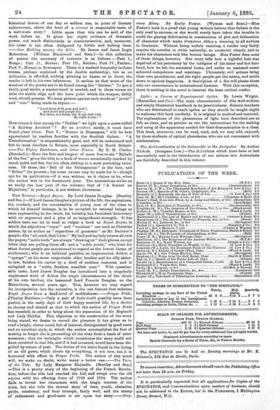NEW NOVELS. — Royal Angus. By Lord James Douglas. (Bentley and Son.)
—If Lord James Douglas's picture of the life, the aspirations, the conduct, and the conversation of young men of the class to which he himself belongs, is to be accepted by rational beings as even approaching to the truth, his lordship has furnished democracy with an argument and a plea of no insignificant strength. It has seldom been our lot to read so vulgar a book as Royal Angus, in which the adjectives " royal " and " reckless " are used as Christian names, by an anther as "regardless of grammar" as Mr. Barham's people, who "all cried, that's him." My lord and my lady swarm all over the pages ; "noble lords" are always "drawing on" their gloves, except when they are pulling them off ; and a "noble youth," who lives for what decent people are accustomed to regard as the lowest forms of excitement ; who is an habitual gambler, an impecunious debtor, a "sponge" on his more respectable elder brother and his silly sister- in-law, finishes his career by a deed of reckless rashness, and is eulogised as a "noble, fearless, unselfish man." With question- able taste, Lord James Douglas has introdneed into a singularly unpleasant work of fiction the tragic circumstances of the death of his own brother, the lamented Lord Francis Douglas, on the Matterhorn, several years ago. This, however we may regard its interpolation into the narrative, is the one feature that redeems Royal Angus from a dead-level of snobbishness.—.—Proper Pride. ,(Tinsley Brothers.)—Only a pair of fools could possibly have been parted, in the early days of their happy married life, by a device so clumsy and absurd as that to which the author of Proper Pride has resorted, in order to bring about the separation of Sir Reginald and Lady Fairfax. This objection to the construction of the story being stated, we desire to record the pleasure it has given us to read a bright, clever novel, full of interest, distinguished by good taste and an excellent style, in which the author accomplishes the feat of making us forget she is proceeding all the time from a basis of utter nonsense ; that the imbroglio which constitutes the story could not have occurred in real life, and if it had occurred, would have been dis- pelled by return of post. The device of the letter found in the lining of an old gown, which clears up everything, is not new, but it is borrowed with effect in Proper Pride. The author of this novel will, we make no doubt, write many a better one.—The Turn of the Tide. By Lady Margaret Majendie. (Bentley and Son.) —This is a pretty story of the beginning of the French Revolu- tion, before the tide had reached the full, and swept over the old regime with the effacing force of 1793 and 1794. The anther fails to invest her characters with the tragic interest of the time, but she tells the eternal story of love, youth, obstacles, pride, constancy, and final triumph, fairly well, and the stamp of refinement and good-taste is set upon her story.—Grey- stone Abbey. By Emily Foster. (Wyman and Sons.)—Miss Foster's book is a proof that young II riters believe that failure is the only road to success, or she would surely have taken the trouble to avoid the glaring deficiencies in construction of plot and delineation of character which make Grepstone Abbey a warning to all novices in literature. Without being unduly exacting, a reader may fairly require the novelist to write naturally, to construct clearly, and to make his characters talk like human beings. Miss Foster does none of these things, however. Her story tells how a rightful heir was deprived of his patrimony by the intrigues of his sister and her hus- band, how he left the ancestral home, and under an assumed name achieved competence and marriage. Ultimately, evil actions bring their own punishment, and the right people get the estate, and settle down to opulent happiness. A description of a fire will please those who are connoisseurs in unintentional humour. With this exception, there is nothing in the novel to interest the least critical reader.














































 Previous page
Previous page